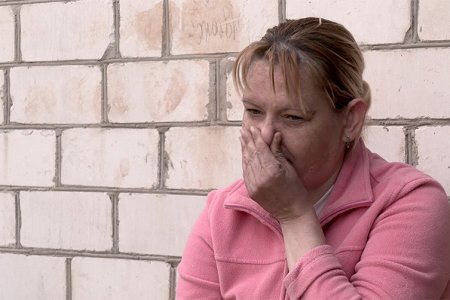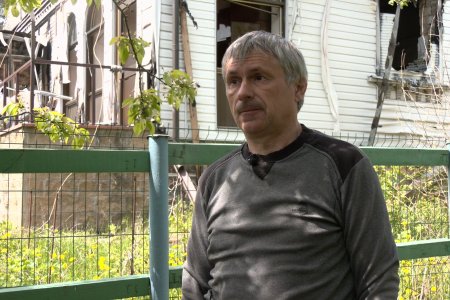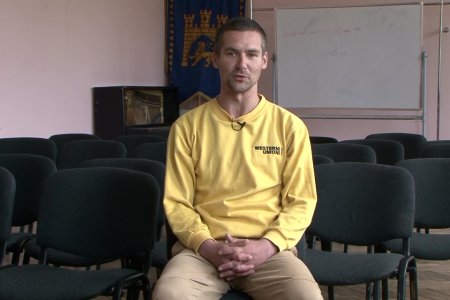He [the Russian soldier] fought in Afghanistan; the call sign was “Uzbek”. He said: “If I get drunk, I can kill my own, let alone a civilian.” There was infantry in Bohdanivka. They drank, beat people, and raped. Here the majority were from tank brigades. I came across nasty ones, and I came across younger than me (I’m 23 years old). The bastards are illiterate. They asked, “What kind of city is this?” although Dymerka is a village.
Could you imagine that there will be a full-scale war?
I had doubts and considered different scenarios. But when all this happened, and I woke up in the morning from the explosions ... A week before that, I dreamed they started bombing us. A week later, the dream became a reality. It’s like a bad dream, but you can’t wake up.
How was the first day of the war for you?
I woke up, and cars were driving; there was some kind of turmoil, and they didn’t say anything on the news ... What should I do? Nobody knows anything. I was rattled, stayed home, and monitored the news. I recently quit my job for personal reasons.
Have you thought about evacuation?
No. I was sure everything would be fine, and they would not reach here.
What happened next?
Disappointment. On 6 March, gunfire and explosions were heard closer and closer. But I watched the local news in Telegram: everything is fine, the purge is underway, the Armed Forces of Ukraine are working, everything will be fine. Well, I believed; I kept looking from the balcony: you can hear it but can’t see it. So I thought everything was fine. I did not prepare a go-bag. And then, on 8 March at two o’clock, it began! It was no longer only skirmishes that could be heard but the roar of a moving column of tanks. I was sitting on the balcony, looking, calling my godfather. I said: “You have to run! Everything is lost! Hide in the cellar.” He answered: “Don’t joke.” I said: “That’s it — I’m already hiding in the cellar.” Then I wrote to my father: “Hide!” Mom, too: “Run, hide.” Then we slipped into the cellar. Grandmother wanted to run into the forest, but there was no time: she could only hobble there. I told her the forest was not an option because you don’t know where to go. We hid in the cellar. Of course, we didn’t have anything there. We only had one chair and another plastic one. But the Russians forced me out of the cellar and exploited me for their purposes. Then I counted about 50 armored vehicles. And later, it turned out so.
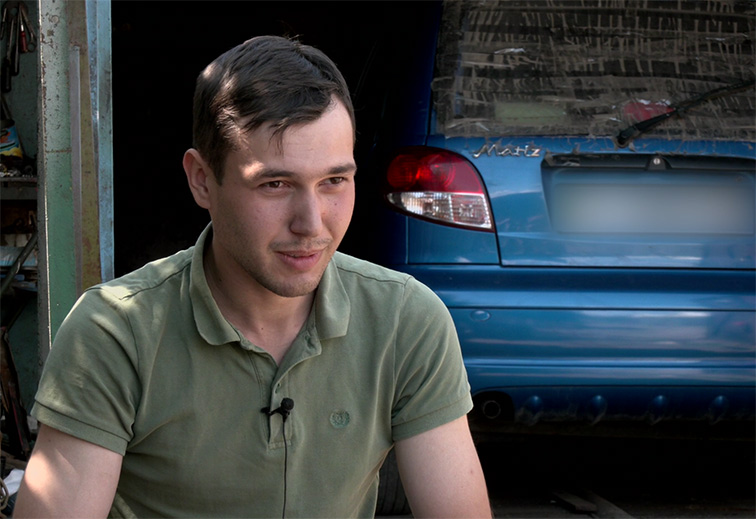
Most of them were in the woods, behind the Zalissia bus stop. Otherwise, they hid near the houses. We rushed into the cellar, and the neighbors from the completely bombed house came to us later: Uncle Peter, his wife, and mother-in-law. Also, there was an older woman with her granddaughter. We hoped the Russians would pass, not linger for a long time: on 8 March, they marched toward Skybyn. But on 9 March, they were beaten, so they returned and began to secure their positions.
We sat in the cellar until 9 March. We were afraid, of course. We thought it only happened in the movies, but it all happened in reality. We heard them breaking into our house: they could not break the door, so they broke the windows.
They managed well, so to speak. Well, what about them? They had basic needs — shoes, shorts, socks, hats, and jackets. I had four pairs of shoes: good sneakers. They took it all and broke into the cellar. First, they knocked and asked if anyone was alive. We didn’t answer because we were afraid. Then they boldly entered. I looked — a soldier in my hat and sneakers — and thought: “Oh-oh-oh, I’m already left without sneakers.” We raised our hands, and they checked us, counted the number of people, and left. They took the phones — they immediately took them away if they found them. They feared the location could be calculated by telephone, and a mine would fly in.
How did they exploit you?
It was 12 or 13 March, I wanted to write down everything in a notebook then, but somehow I was not up to it. They saw a tractor and a MAZ dump truck. They did not start the dump truck because the battery was dead, and they needed my tractor. At first, they wanted to start it on their own, but it did not work out.
They pulled me out of the cellar and said I had no options. It is either “Yes” or death.
I had to start the tractor, run it and do what they said. They needed cinder blocks to protect the windows in the houses where they had headquarters. The village was divided into sectors, each with its commander — a certain number of people and a commander. And so I took this brick from my yard, and my grandmother had tears in her eyes because I took out my material. They blocked the windows with this brick. Then the metal was prepared for the dump truck body repair; they used it for dugouts.
Once there was a moving car, so they shot at it. There were a husband, wife, mother-in-law, and dogs. Later, the deceased’s brother came to me and said they were from Nova Bohdanivka. His wife insisted they needed to leave. He knew it was impossible, but he listened to his wife and started moving in the oncoming lane because it was impossible to turn around. They drove in the opposite direction, and they were senselessly shot. The husband died. His wife was fine, but the mother-in-law was shot in the hand... Somewhere on the fourth day of my service, I brought the metal, and then the Russians asked me to take that man’s body to the cemetery. We loaded the body, and my dream was to see the village.
As soon as I saw the village, I almost fainted. I wept intensely for that man and the village. It was horror — all ruins.
And they asked me: “Who is this, your brother? Why are you crying like that?” I said: “No, not my brother, just a living person without weapons. He could’ve been my brother — what’s the difference? Why did you kill a man without a weapon? Civilian! — “We shot at the wheels.” — “I saw that they shot at point-blank range into the windshield.” — “Well, it happened accidentally.” That is, they killed a person — it was probably for fun.
We took him to the cemetery but didn’t have time to get there because of the shelling. They dragged me to the stop at the end of Zalissia, into the woods. Then I saw the amount of equipment there, and I had no hope that all this would end soon. I thought it would drag on for a long time: not for weeks, for months of occupation. Then the shelling ceased, and we buried the man. I said: “We need at least take the number from the car and put it next to the burial so that at least by the number, it can be found later.” They said: “Well, you know him, you saw him, you’ll figure it out somehow.” That’s how we buried him.
How and when did you manage to evacuate?
We left on the 21 March with my cousin, who lives across the street. We had the opportunity to visit each other. Chat, meet. By then, we more or less got to know these soldiers, and there were adequate ones among them. The cousin had the opportunity to charge the phone, and he was able to receive messages. He received a message from the State Emergency Service that there would be an evacuation on such a date at such and such a time. But there was no information about Zalissia, no corridors. We had to leave ourselves. We had an agreement with the soldiers.
They said you have five minutes to pack and a one-way road. If you come back — we will shoot you.
Well, that’s all, but what can you do ... There was nothing to lose. The house was destroyed, and all property was destroyed. Only life mattered.
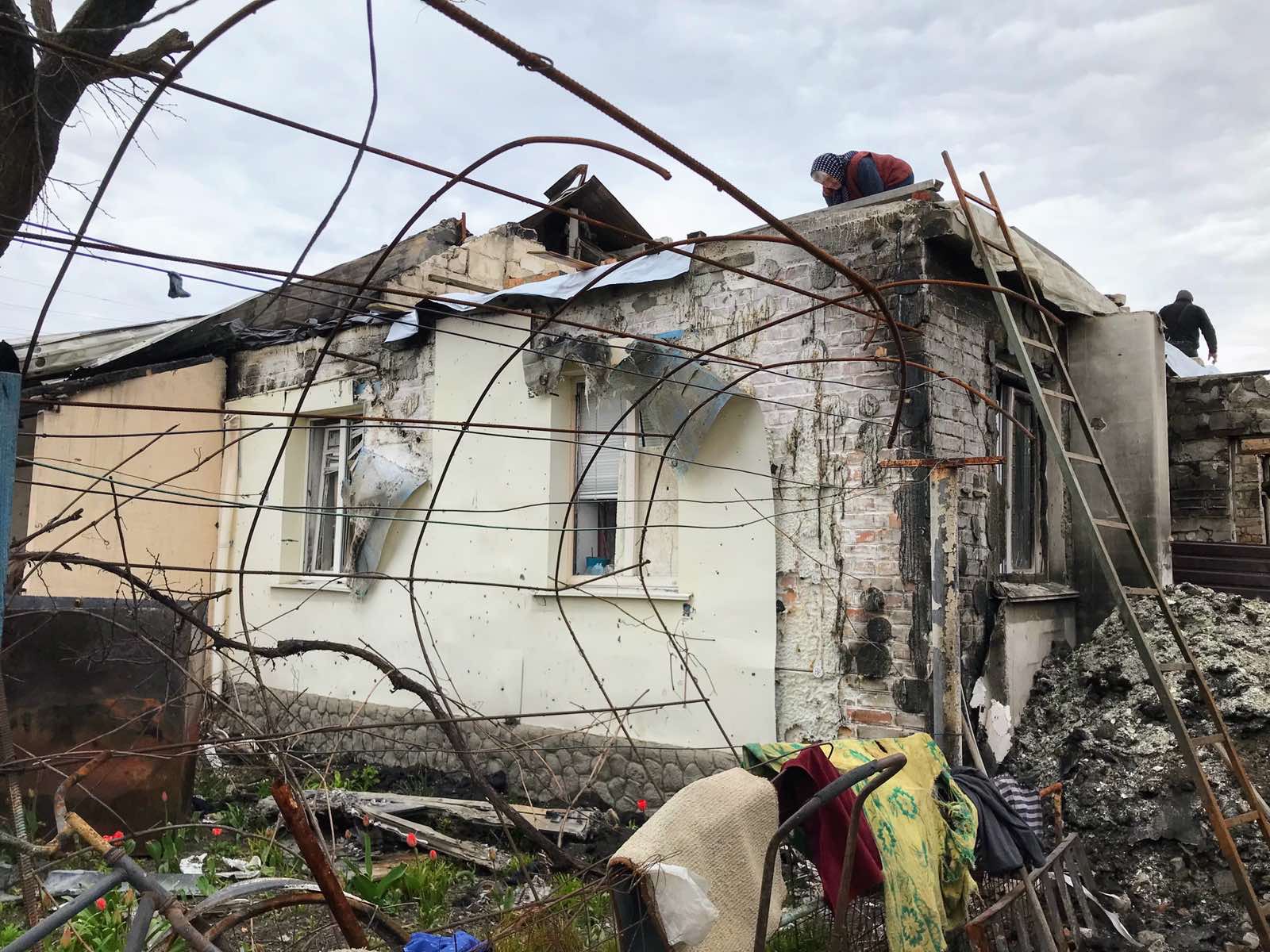
The house had not yet burned but was damaged. Just on the day we evacuated, everything burned down. I was getting my grandmother into the car — it was thrashed by rubble but on the go. Grandmother started to load the chickens because these were ours, but I said: “ Leave the chickens — Life must be saved!” And she is: No! Finally, we found a “compromise”: I threw those chickens out of the car and drove it out, and that was it.
In principle, it was not difficult for us to leave because the road was intact. But my cousin was not so lucky: there was a tank there, and they [the Russians] dug all around it. We worked another 20 minutes with shovels to dig out his exit. I pulled his car with my Slavuta and barely pulled it out. We went with white flags, on the hood, with inscriptions: “Civilians”, and “Children”. We went in the direction of Bohdanivka to the center — a column formed in the center of Bohdanivka. We saw people and realized that we were not alone.
Then, when people were already standing in the column, Russian soldiers, with a look of “We are the masters here”, drove around the cars in tanks. They threw stun grenades and rode on someone’s mopeds and tractors.
Anything they wanted, they took. And those who had the inscription “children” on the car, those children were given sweets stolen from a nearby store. They show who they are. From Bohdanivka, we went to Rudnya, Semypolky, then through the Litkivske forestry, Litky, Pogreby, Zazymye, the Kyiv poultry farm, and Brovary. Who wanted to Kyiv — went to Kyiv. I brought neighbors to Brovary, met with my brother, and went to his place in Kyiv. I lived with him for about two weeks, then returned here at the first opportunity.
What happened in Zalissia after liberation?
The house is burned down, but, thank God, the dogs are alive. Chaos is complete. About 80 percent of the homes have been destroyed, and there is not a single house that shell fragments have not hit. The house is visually intact, but when the underground passage exploded, a deformation occurred from the shock wave and a powerful explosion. The place seems intact from the outside, but ... There are many surprises: bubby traps and mines. It was not safe to be here, but I walked carefully.
What about your property?
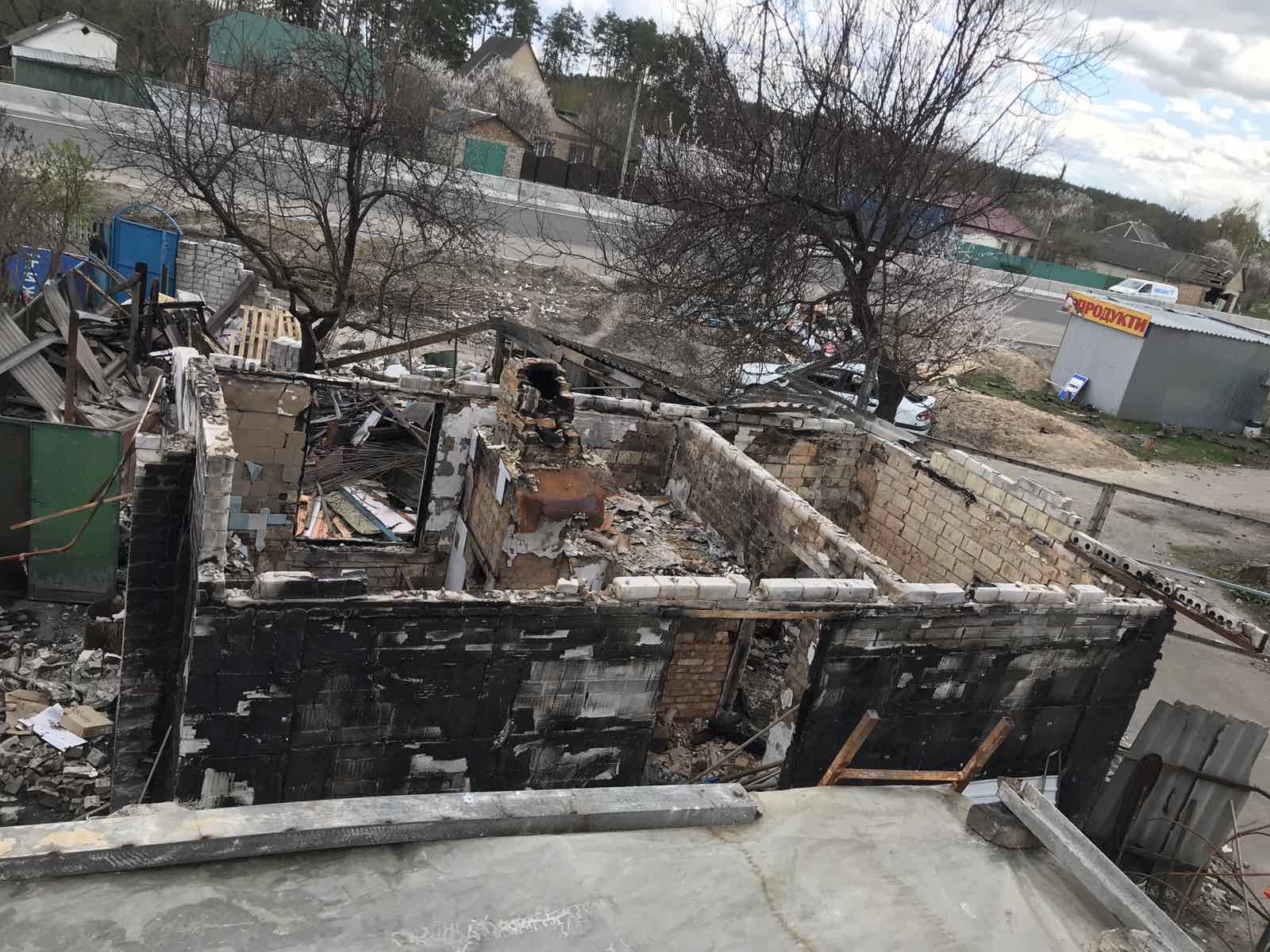
The roof is completely destroyed. The kitchen, where there was paneling, survived and burned down where it was not. The neighboring house had an exit to the second floor; everything burned down, so now we are suffering. There is a possibility that the house will collapse.
What are you planning to do next?
Plans? To have a regular job, a regular salary. God granted we bring everything back to the state it was by ourselves and maybe even make it better. And the war to end.
Has your attitude towards Russians changed?
Of course, even before I knew they were like that ... However, when I met them face to face, I realized they were cut off from reality. They were already in Ukraine in the village of Zalissia and told me about some Banderites [Ukranian nationalists] and Nazis. I said: “Are you crazy? We don’t have Banderites! You already see everything with your own eyes.” — “No, here we will find Banderites and the Nazis and punish them.” I said: “Well, go ahead and look.” The propaganda consumed them so much that they didn’t understand anything. As if they were given a program, and they execute it — Banderits, Nazis ... They are clueless people.
